Gaza: Unending Cannon Fire and Steel Helmets
[NB: check the byline, thanks. /~Rayne]
Before Congress’s Easter week break earlier this year, there had been negotiations to allow Israel’s Benjamin Netanyahu to speak before Congress. He was not granted that opportunity though reports indicated vacillating opinion in the House and Senate.
It would be a grave mistake to allow Netanyahu such a platform; it would confer legitimacy to his policy toward Gaza.
That policy includes genocide. The U.S. may support the right to self defense of nation-states, but it cannot ever support genocide – not even the appearance of doing so by allow a mass murderer a platform.
Gaza’s history, the complexity of geopolitics involved, along with Netanyahu’s narcissistic intransigence and stifling U.S. policy prevent the Biden administration from openly calling Netanyahu’s actions genocide.
But the genocide of Gazans isn’t something new. It’s part of decades of increasing repression. One only needs to look at a map and the numbers — hell, even satellite photos taken over time — to know this situation didn’t develop in the last handful of months.
It continues with the repeated attacks on and murder of humanitarian aid workers who have been trying to fend off famine.
We’ll need far more than maps and numbers to stop this mass murder.
The Congressional GOP caucus allowing Netanyahu to address Congress next month does absolutely nothing to discourage his policy of genocide – rather, it encourages it.
OVERVIEW
In a nutshell, Gaza is a population the size of Houston crammed into an area the size of Las Vegas — more than 2 million people crammed into 141 square miles. There are only three crossings in and out, two guarded by Israel and one by Egypt, with the perimeter surrounded by a double fence line on three sides and the ocean on the fourth.
Gaza has been under blockade since 2005 following the second Intifada, though Israel has closed the region off and on since 1991.
Israel tightened the blockade after Hamas was elected to power (2006); this change in power was a response to the blockade and the ineffectiveness of the Palestinian Authority to address Gazans’ needs.
After nearly twenty years of Israel’s tightening stranglehold punctuated with fuel restrictions (2007), closed crossings thereby blocking food (2008), and an ongoing need for humanitarian aid (2010-on), it can hardly be surprising a rebellion by Hamas occurred.
Americans have been looking away for years, avoiding the obvious build up to October 7, 2023. We can’t look away any more.
Look at this rather dispassionate map of Gaza before October 7, prepared by the U.N.’s Office for the Coordination of Humanitarian Affairs. These were the facts on the ground before October 7 with which the U.N. and other aid organizations had to work to address Gaza’s needs not met by occupier Israel.
(source: UN Office for the Coordination of Humanitarian Affairs – occupied Palestinian territory, via Wikimedia)
Could Americans live with this, in this? Could they raise children under these conditions, essentially inside a large double fenced cage from which land and housing has been stolen?
Can we begin to understand why there are tunnels in and out of Gaza?
What are we defending by looking away?
AMERICANS’ PERCEPTION
The politics of the past which have long shaped and conditioned global public opinion are being used as a means to prevent us from seeing more clearly what’s going on in Gaza and across the Middle East.
At least a couple of commenters at this site have mentioned the 1960 movie Exodus, a fictionalized account of Israel’s founding as a nation-state. This film has colored Americans’ perception of Israel for 63 years, in concert with a lack of education about the entire Middle East.
Americans don’t even learn about their own internal conflicts like the Tulsa race massacre or the cause and effects of the Chinese Exclusion Act. They learn little about the history of conflicts abroad, and about the history of Arab and Persian worlds, they learn even less.
What Americans have learned in K-12 public education is that Nazi Germany and its totalitarian dictator were evil and responsible for the deaths of millions of Jews in the Holocaust – a wholly accurate depiction. Children are exposed to the primary text Anne Frank’s diary and fictional texts like The Boy in the Striped Pajamas. Students are conditioned to see Israel’s creation and statehood as a positive, constructive response to the persecution and genocide of Europe’s Jews in 1930-1940s.
This is the lens through which Americans view the film Exodus.
The American public has been further conditioned by foreign terror attacks of 1990s and 2001, shaping and shaped by government response. As events unfolded, U.S. media coverage rarely ever examined the events from a decolonizing perspective.
All of this material has conditioned much of the U.S. to afford wide latitude to Israel.
U.S. foreign policy which supports democracies and affirms independent sovereign nation-states’ right to self defense reinforces that latitude.
Looking the other away has been cultivated for a lifetime, further reinforced by a fear of being called anti-Semitic if Israel’s policies and actions are called into question.
Jews are not Israel. Israel is not Benjamin Netanyahu, just as Gaza is not Hamas.
And yet all of Gaza is suffering for Netanyahu’s fuck-up, while Jews abroad and a majority of Israelis at home are confronted with the fallout.
By fuck-up I mean one massive intelligence failure followed by many others.
INTELLIGENCE FAILURES
After looking at recent history of Gaza and the conditions in which Gazans live, the October 7 attack isn’t much of a surprise.
What was a surprise: Israel’s intelligence failures the October 7 attack exposed.
Israel has a history of using targeted intelligence to eliminate potential threats, including extrajudicial execution. Why Israel did not act effectively to prevent October 7 looks as stunningly bad as George W. Bush’s failure to respond pre-emptively to al Qaeda’s threat against the U.S. in August 2001.
Israel’s leadership and military knew there was a threat. Netanyahu failed to ensure Israel was protected.
New York Times report says Israel knew about Hamas attack over a year in advance
Netanyahu failed to do his job for an entire year – but his follow-up to his massive fuck-up is obliterating the population of Gaza.
The attack on October 7 wasn’t the only problematic intelligence failure.
Israel has been less than forthcoming about its operations; though its intelligence knew of the existence of tunnels, it can’t explain how it missed a tunnel as large as the one near the Erez crossing at the border with Egypt.
Israel finds large tunnel adjacent to Gaza border, raising new questions about prewar intelligence
Nor can Israel explain deadly attacks on facilities which were alleged to be supported by intelligence but violate international law. Too many of the attacks have been proven unjustified by follow-up reporting, the most common of which is the excuse Hamas has used tunnels beneath buildings which later prove to be false.
Also poorly rationalized is the use of artificial intelligence to target Hamas, again leading to destruction of civilian infrastructure and civilian deaths. This is a form of human experimentation in addition to yet more war crimes.
The January 24 attack on the United Nations Relief and Works Agency for Palestine Refugees (UNRWA) sheltering thousands of Gazans was beyond the pale:
A United Nations building sheltering displaced Palestinians in southern Gaza was hit by Israeli tank fire Wednesday, killing at least nine people and injuring 75 others, according to the UN Relief and Works Agency in Gaza.
Israel’s military said it “currently” ruled out that an Israeli aerial or artillery strike hit the UNRWA Khan Younis Training Center. The IDF also said a “thorough review of the operations of the forces in the vicinity is underway.”
UNRWA Commissioner-General Philippe Lazzarini said on X that the entire center, one of the largest UNRWA facilities in Gaza, was sheltering 30,000 people, and is clearly marked as a UN site.
The White House said it is “gravely concerned” by the strike.
(source: CNN, January 25, 2024)
The attack followed months of strikes on other UN and humanitarian aid facilities. The UNRWA attack also suggests a possible fuck-you to the U.S. as there was no apparent advance notice to the Biden administration let alone the UN.
Israel initially denied responsibility for the attack on the UN refugee compound. It later claimed UN personnel were aiding Hamas as a rationalization for the attack.
You’ll note Biden got the CIA involved in negotiations after the IDF attacked UNRWA:
Biden to deploy CIA director to help broker major Gaza deal
That CIA director William Burns has been called upon to perform a diplomatic mission is an indication something bad happened with the January bombing of UNRWA, beyond the obvious human rights violation such an attack on a humanitarian mission represents.
Something deeply wrong occurred requiring a person at the highest levels of security clearance to be involved. I can’t help but think the IDF killed a CIA agent or an important asset, perhaps as a fuck-you, perhaps as a means to disrupt US intelligence, or both.
The UNRWA assault was followed by the bombing of Rafah during the Super Bowl when Americans would be distracted — Rafah, where Palestinian civilians had been told to go to avoid IDF bombing.
Israeli strikes hit Rafah after Biden warns Netanyahu to have ‘credible’ plan to protect civilians
95 civilians including 42 children were killed during this attack on Rafah. This was hardly a surgical effort intended to take out Hamas alone.
The attack on Rafah looked like yet another fuck-you to the Biden administration even after months of repeated embarrassing appeals to Netanyahu to protect civilians and allow humanitarian aid, of which one of the earliest came a couple weeks after the October 7 attack:
President Joseph R. Biden, Jr. spoke this afternoon with Prime Minister Benjamin Netanyahu of Israel. The President welcomed the release of two additional hostages from Gaza earlier today, and reaffirmed his commitment to ongoing efforts to secure the release of all the remaining hostages taken by Hamas – including Americans – and to provide for safe passage for U.S. citizens and other civilians in Gaza. The President also underscored the need to sustain a continuous flow of urgently needed humanitarian assistance into Gaza. The President updated the Prime Minister on U.S. support for Israel and ongoing efforts at regional deterrence, to include new U.S. military deployments. They agreed to speak again in the coming days.
(emphasis mine; source: The White House, October 23, 2023)
The deaths of more than 100 Gazans attempting to receive food aid in March was yet another likely fuck-you. Israel was supposed to have arranged for the aid delivery which should have included security. Instead there have been claims IDF fired on Palestinians causing a stampede toward the aid trucks.
Mark Regev, the Israeli prime minister’s special adviser, initially told CNN that Israeli forces had not been involved. Rear Adm. Daniel Hagari, the Israel Defense Forces’ (IDF) spokesman, said soon after that soldiers had not fired directly on Palestinians seeking aid, but rather fired “warning shots” in the air.
On March 8, after an internal investigation, the IDF released a timeline suggesting that the aid convoy began to cross into northern Gaza accompanied by its tanks at 4:29 a.m. A minute later, at 4:30 a.m., the IDF said its troops fired “warning shots” toward the east to disperse crowds before firing at “suspects” who they claimed posed a threat. At 4:45 a.m., the military said it fired more warning shots.
But CNN’s analysis of dozens of videos from the night and testimonies from eyewitnesses’ casts doubt on Israel’s version of events. The evidence, reviewed by forensic and ballistic experts, indicated that automatic gunfire began before the IDF said the convoy had started crossing through the checkpoint and that shots were fired within close range of crowds that had gathered for food.
(source: CNN, April 10, 2024)
Israel claims the deaths were cause by trucks running into Palestinians; they’ve resisted calls for full, unedited video of the mass shooting, which does nothing to bolster their claims that the IDF did not fire on the swarm of desperate Palestinians.
The airstrike on World Central Kitchen aid workers in clearly marked vehicles is a massive fuck-you which has been blamed on intelligence:
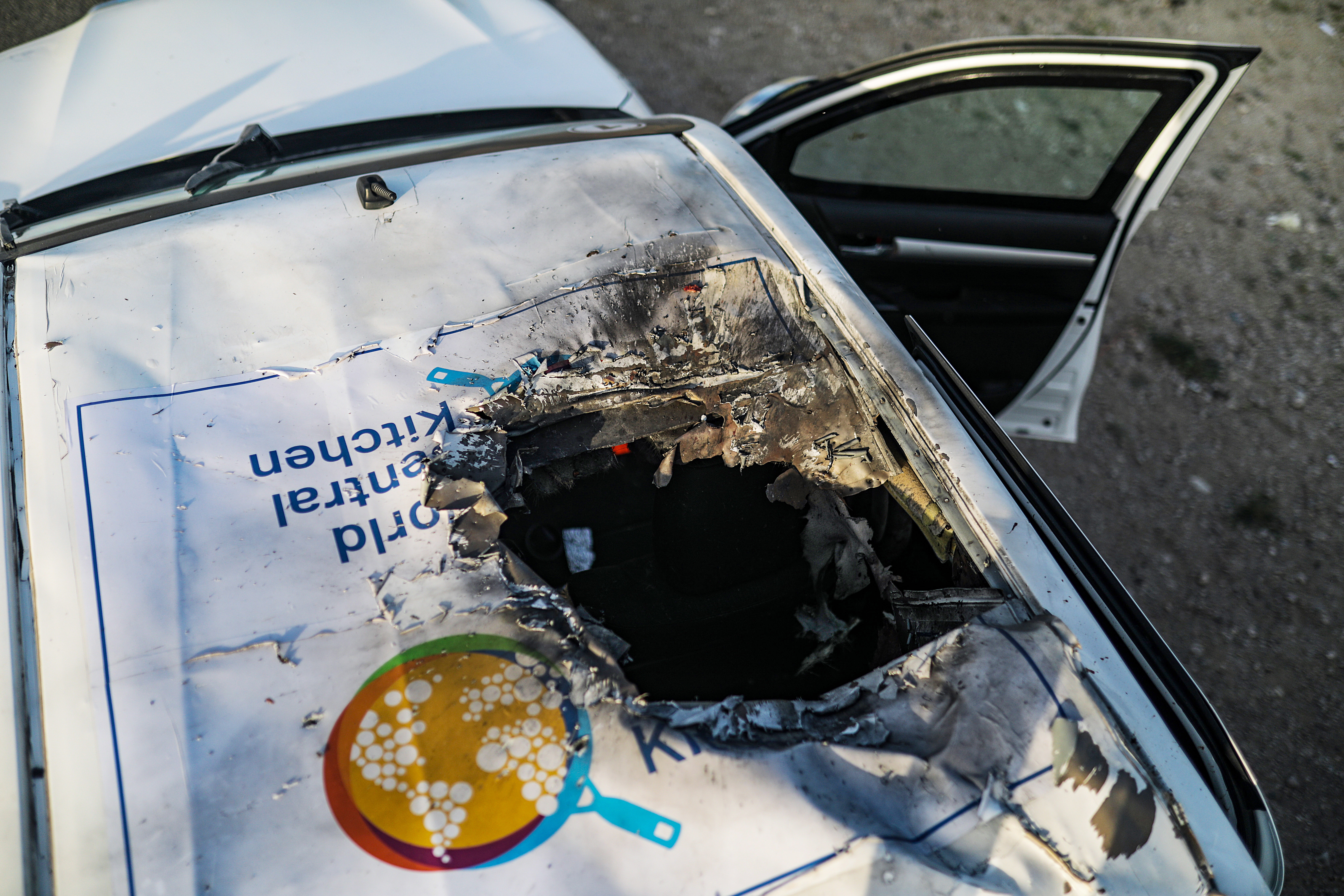
(source: Al Jazeera, April 2, 2024)
IDF missed the center of the logo identifying the World Country Kitchen aid vehicle by centimeters. Accident, my ass; if they targeted a driver in a left-hand drive car the IDF nailed them.
None of this makes sense, this absolute refusal by Netanyahu to be reasonable and rational let alone moral and ethical if Netanyahu is truly focused on eliminating Hamas and only Hamas. Instead these attacks on civilians look organized and systemic – as if the cruelty was the point.
REGIONAL EFFECTS
Saudi Arabia’s absence in news coverage related to negotiations is also troubling; is it because the U.S. media is blind or is it because there’s little to report? Netanyahu trashed Qatar for its efforts, further heightening regional tensions; Egypt and Lebanon have been engaged in negotiations, with Lebanon being bombed on one occasion under the ruse that Hezbollah deserved it though the paramedic center it struck contained no Hezbollah, and in at least one other incident, children were killed.
Could this simply be part of the messy proxy war with Iran, which is more easily seen in the attacks by and on the Houthi in the Red Sea affecting private shipping and military targets.
Israel’s April 2 airstrike on Iran’s consulate in Syria offers a much more direct example of tensions between Israel and Iran; with this attack Israel exercised a total disregard for Syria’s sovereignty and international law.
It also showed Netanyahu cares not one whit whether his government widens the Israel-Hamas war, escalating regional tensions.
NETANYAHU’S BAD FAITH
The repeated intelligence and military failures and cack-handed political decisions can’t be explained away in relation to attempts to destroy Hamas or to recover hostages – not when Israel killed three of its own hostages.
Especially since Netanyahu supported Hamas for years to prevent a more legitimate Palestinian Authority from pursuing a two-state solution.
Nothing makes sense except that Netanyahu is ethnically cleansing Gaza. Calling the goal or operation “Absolute Victory” or “Total Victory” doesn’t imply a narrow targeted effort.
Is it possible he is doing so for his own corrupt criminal purposes while he is still free and not prosecuted and incarcerated for corruption, relying on national security, political, and religious rationales as cover?
By criminal purposes I mean Netanyahu is continuing the assault on Gaza as a means to delay his trial (imagine Trump using this excuse), and clearing Gaza for some benefit to the missing Saudis (possibly oil and gas development offshore).
Is Netanyahu not only using this genocide to delay his trial but as a means to earn a payout like the $2 billion Trump’s son-in-law Jared Kushner received, perhaps as a payout for assassinating Iran’s Major General Qasem Soleimani, damaging Iran’s missile program, and greenlighting the murder of a Saudi-born U.S. journalist?
Is Netanyahu clearing Gaza because he wants more Trump property development — and Kushner has already indicated interest in oceanfront property in Gaza?
Is Netanyahu blowing off Biden because this entire genocide is a form of election interference intended to drive down Biden’s polling numbers, because Netanyahu wants Trump in the White House who’ll condone his complete obliteration of Gaza? Is Netanyahu killing Gazans because he wants an equally corrupt leader who’ll ensure he gets all the support he needs, politically and personally?
Is this the point at which Arendt‘s thinking about statelessness matters (see Ed Walker’s essay here), because so long as Palestine is not a second state, its claims to its own natural resources can be blown off and its obstructive people blown away by profiteers?
Energy firms face legal threat over Israeli licences to drill for gas off Gaza (15-FEB-2024)
Offshore Gas Field Could Help Gaza Recovery (23-NOV-2023)
Saudi Arabia Can No Longer Raise Oil Output For Cash (21-FEB-2024)
Perhaps this is why Netanyahu appointed problematic officials ultra-nationalists Bezalel Smotrich and Itamar Ben Gvir whose interests in a peaceful accord with Palestinians in Gaza are likely nil.
Consider Ben Gvir’s 2007 conviction for incitement to racism and supporting terrorism. Why would such a person be appointed as National Security Minister if peace was the intention?
Ben-Gvir convicted of inciting to racism
Consider also Smotrich’s disregard for the Palestinian Authority circa 2015, bolstering Hamas:
Most of the time, Israeli policy was to treat the Palestinian Authority as a burden and Hamas as an asset. Far-right MK Bezalel Smotrich, now the finance minister in the hardline government and leader of the Religious Zionism party, said so himself in 2015.
According to various reports, Netanyahu made a similar point at a Likud faction meeting in early 2019, when he was quoted as saying that those who oppose a Palestinian state should support the transfer of funds to Gaza, because maintaining the separation between the Palestinian Authority in the West Bank and Hamas in Gaza would prevent the establishment of a Palestinian state.
There had to be a point to all this deliberate fucking around with Hamas, something Netanyahu was willing to throw Israeli lives at, something for which Gazans were expendable.
U.S. POLICY CHALLENGES
Meanwhile, the politics of the past and Americans’ ill-formed perceptions have locked the US into a position where it can’t move against Netanyahu without criticism or worse for being anti-Israel, at a time when the US must also rely on intelligence from Israel and other Middle Eastern countries in order to protect oil and gas which are under attack by Iran-backed Houthi.
Except for a blip in January this year, note how there’s little media coverage about the response of oil markets and fossil fuel countries affected by the Houthis’ attacks. This absence combined with relatively stable oil market prices suggest the Biden administration has been told to put up and shut up to maintain the global economy – or the Biden administration’s investment in U.S. oil production has offset Middle East oil production burps.
(source: West Texas Intermediate/NYMEX price per barrel via Macrotrends)
It’s not clear how much the U.S.’s continued support of Netanyahu’s policies in Gaza are spurring Iranian support of the Houthis, but fighting off the attacks comes at the expense of U.S. defense spending in other areas of the world including Ukraine.
It also comes at the expense of resources necessary to stem nuclear proliferation in the region, which includes Iran. Iran has continued to rebuild its uranium refining since Stuxnet, and is now expanding capacity at two locations.
Normalization of Israel-Saudi Arabia relations has been an aim of U.S. policy, including a two-state solution.
The Abraham Accords and possible Israeli normalization with Saudi Arabia. The Biden Administration has followed agreements reached during the Trump Administration that normalized or improved relations between Israel and four Arab or Muslim-majority states—the United Arab Emirates (UAE), Bahrain, Sudan, and Morocco. Biden Administration officials have said that any further U.S. efforts to assist Israeli normalization with Muslim-majority countries would seek to preserve the viability of a negotiated two-state solution to the Israeli-Palestinian conflict. Ongoing efforts to deepen security and economic ties between Israel, the UAE, Bahrain, and Morocco could drive broader regional cooperation—including on various types of defense. After China helped broker diplomatic normalization between Saudi Arabia and Iran, the Administration has declared that Israeli normalization with Saudi Arabia is a U.S. priority. Any negotiations toward that end would likely consider Saudi security and civilian nuclear demands, as well as a pathway toward a two-state solution. Congress has passed and proposed legislation encouraging expanded and deepened regional cooperation involving Israel.
(source: Israel: Major Issues and U.S. Relations, Congressional Research Service, September 27, 2023)
Netanyahu has repeatedly rejected the two-state solution, in spite of the fact his policies treat Gaza and Palestine as a separate state on which it can declare and go to war instead of conducting a police action within the same country. He wants it both ways — to conduct a war and treat the persons in that separate state as non-citizens, but failing to protect the civilian minority citizenry of that same state if it is part of Israel. Yet hanging onto this single state including occupied territory so tightly has not brought Israel any more security.
It’s as if it has never occurred to Netanyahu that Israel’s security might actually depend on ending occupation of Gaza and allowing its citizens to govern themselves.
Consider the aphorism that insanity is doing the same thing over and over and expecting different results. This applies not only to Israel but to the U.S.; we cannot continue to support continued intransigence when it comes at a cost to our nation’s security. Is the bilateral aid in a 10-year memorandum of understanding which the U.S. negotiated with Israel worth more than the current and future cost of the unending Israel-Hamas war to our nation?
CONCLUSION
There is a limit the U.S. must find and define when it comes to support for Israel. We may believe in the right of sovereign independent nation-states to self defense, but we have failed as a nation when it comes to identifying and fighting just wars. The response to the terror attacks of 9/11 offers the best example of this failure; we spent roughly eight trillion dollars and nearly a million U.S., Iraqi, and Afghans’ lives on what should have been a measured police effort.
A substantive portion of that failure was in no small part based on hidden agendas including continued access to cheap oil.
We should have learned from our failures; other nations including Israel should have learned by observation.
We did not win hearts and minds though we had the sympathy of the world on 9/12, just as Israel did on October 8. Instead the U.S. used its hegemonic power to strive for more than a narrowly tailored effort to find and hold the terrorists accountable.
Look what it earned us more than two decades later, when combined with our handling of Netanyahu.
Israel should have learned already they are failing to win security and a durable peace, and in writing that I don’t mean Netanyahu because the man has proven repeatedly since October he is incapable of anything more that overreaching destruction. The Israeli people need to look long and hard at what has and has not worked for the last 60-70 years.
In a eulogy over a young kibbutz member killed by Palestinians in 1956, Israeli Commander-in-Chief of the Israel Defense Forces Moshe Dayan said,
… Let us not cast the blame on the murderers today. Why should we declare their burning hatred for us? For eight years they have been sitting in the refugee camps in Gaza, and before their eyes we have been transforming the lands and the villages, where they and their fathers dwelt, into our estate. …
In essence Dayan’s eulogy exhorted Israelis not to let down their guard, to embrace the steel helmet and cannon to continue to settle the land, even as he acknowledged the theft of land by colonization and occupation.
Israel has its own lessons to learn, which is that of colonizer which must share a small patch of land at the risk of permanent conflict inside its own borders and beyond.
Under Netanyahu’s leadership, it has given no indication it is learning anything at all about its own history, its reputation and security with its neighbors and across the world, or how it will be seen as history is written.
___________
[Front page photo: satellite image by Maxar published in Business Insider showing Gazans fleeing to north Gaza after IDF told Gazans to leave southern Gaza ahead of bombing. Gazans had already fled to south Gaza 2-3 weeks earlier at IDF’s order.]

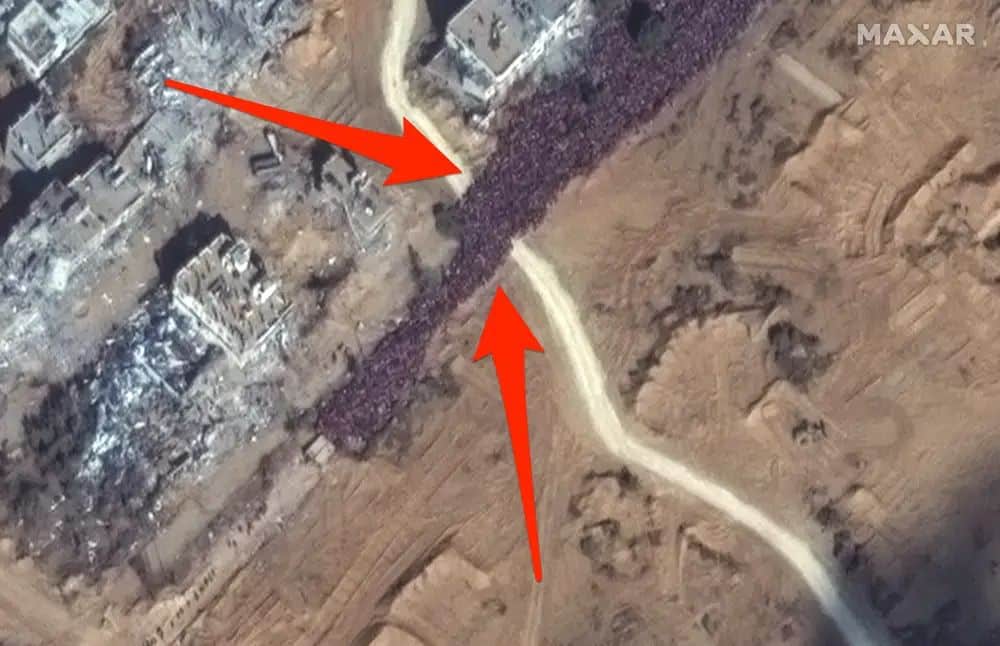
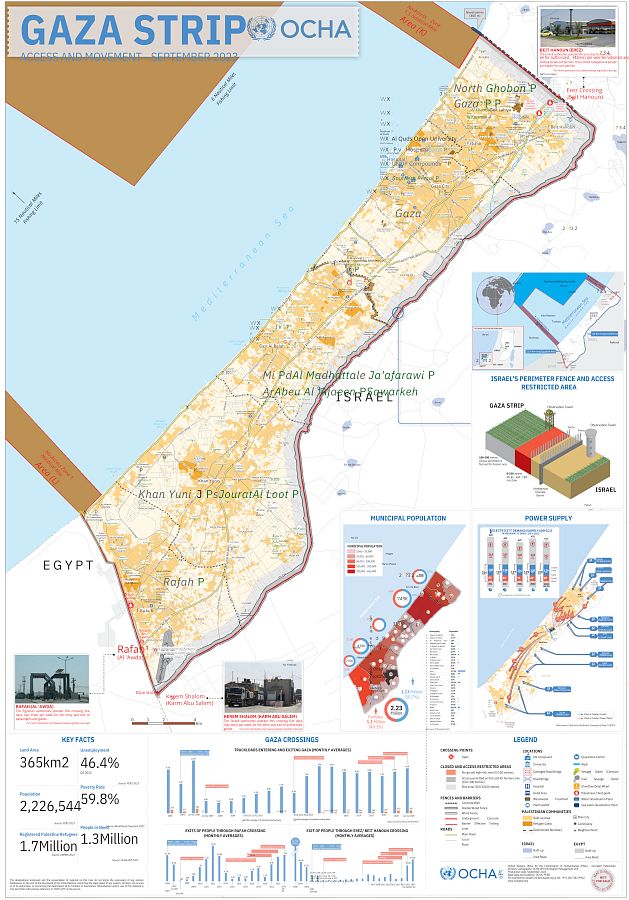



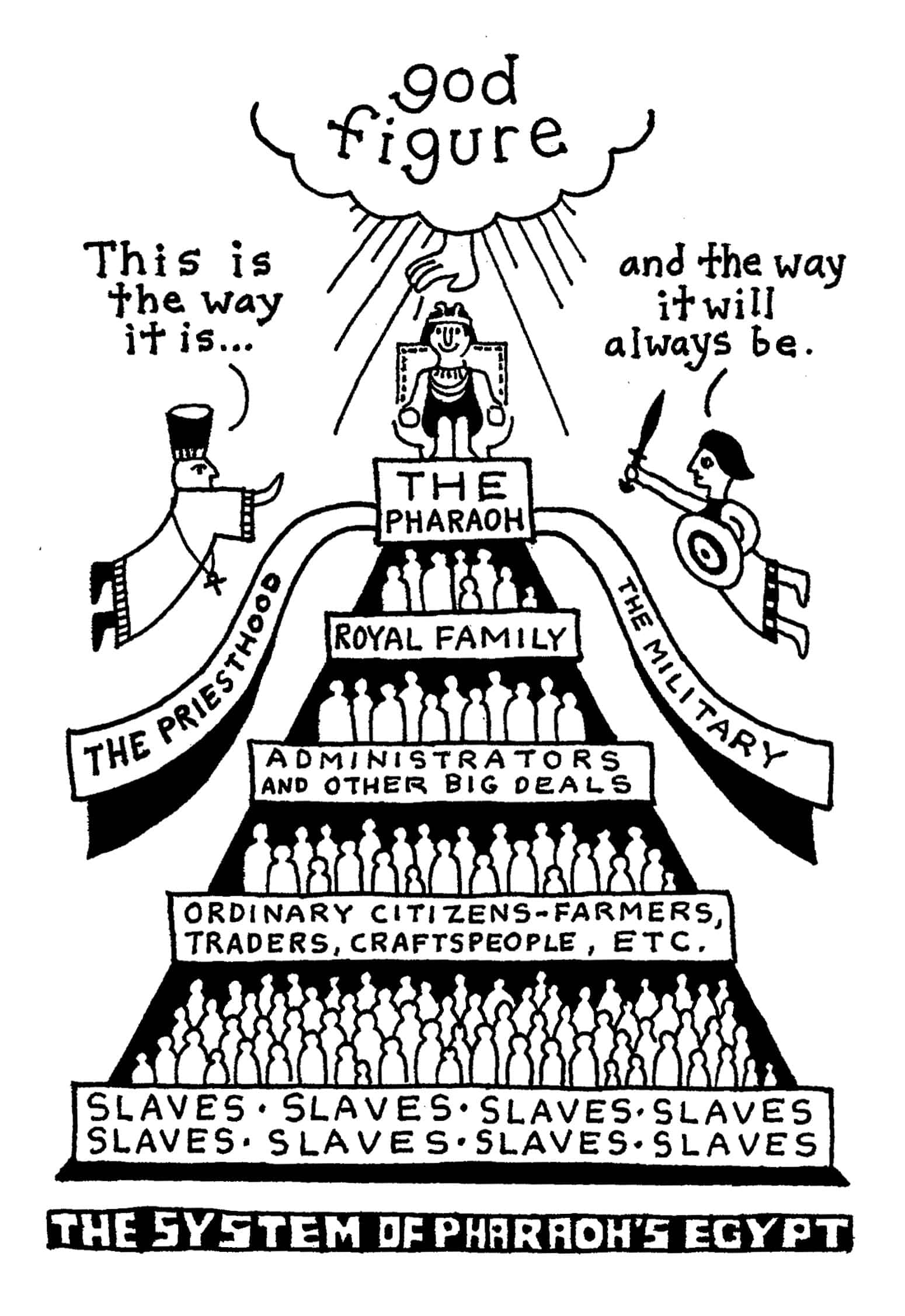
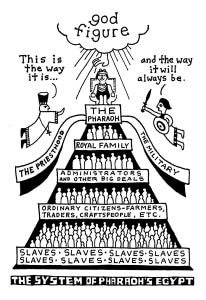
 Public Domain, https://en.wikipedia.org/wiki/Hannah_Arendt#/media/File:Hannah_Arendt_1933.jpg
Public Domain, https://en.wikipedia.org/wiki/Hannah_Arendt#/media/File:Hannah_Arendt_1933.jpg
